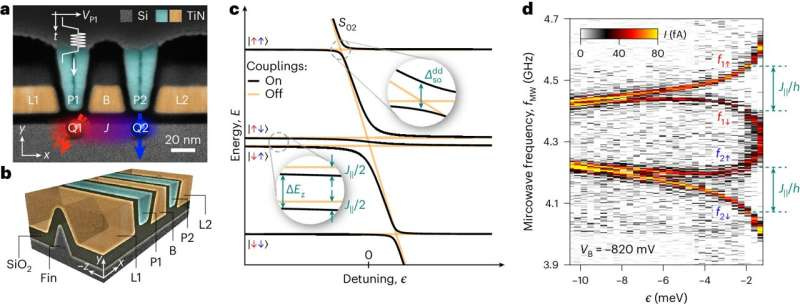The Week in Quantum Computing - May 13th 2024 - Illinois, JPMorgan, IBM, Ryken and more
Issue #185
The Week in Quantum Computing. Brought to you by Sergio Gago (@piratecto).
Quick Recap
In a bid to establish Illinois as a quantum computing hub, Governor J.B. Pritzker is seeking $500 million for a $20 billion quantum computing campus in Chicago, led by Silicon Valley startup PsiQuantum. This project, potentially the largest tech project in the state's history, is anticipated to create up to 1,500 jobs. SafeLogic has launched an Early Access Program for its next-gen cryptographic software modules, which support all Post-Quantum Cryptography (PQC) algorithms that NIST plans to standardize in summer 2024. Researchers have developed an ultra-pure form of silicon, which could potentially be used for creating highly reliable "silicon-spin qubits" in quantum computers. Meanwhile, PsiQuantum movement into Australia with the big investment from the government is receiving some heat from both the industry and the public, with questions on the selection process and the real impact of those taxpayer dollars. Lastly, JPMorgan Chase has developed a quantum-secured crypto-agile network, highlighting the growing importance of quantum-resistant encryption.
A Community game
Those of you who read me on LinkedIn, or follow this newsletter for some time, probably know that I typically take a balance stand on the ongoing industry-academia battle. Optimist vs Realist fight if you will, but trying to share the message that you need both. Quantum is a small industry (sorry folks, you may seem big, but you ain’t). I have an ongoing survey that I ask every single professional in the industry: “How many people work full time in the quantum industry outside of academia?”. I will share the results in a future newsletter but as you can imagine, the numbers are tiny compared to AI or any other technology for that matter.
That is why this is a community game. And you better go with other people you trust. The cake is big enough. In fact we can make it very big together instead of trying to fight for the crumbs.
In that sense, I wanted to share some newsletters, podcasts and in general, friends who write often about quantum and typically offer amazing insights and information on what is going on. It is also a shout out to friends that share the journey.
Brian Siegelwax’s medium (and books!)
And of course, my source of hype inspiration and snarky comments (for the good or the bad). DulwichQuantum.
There are more, sorry If I missed you! But the point is. Don’t go alone. This is a party, and the kitchen is on fire. Let’s make a cake.
The Week in Quantum Computing
SafeLogic Unveils Early Access to Next-Gen Cryptographic Software, Paving the Way for Post-Quantum Cryptography Adoption
SafeLogic has launched an Early Access Program (EAP) for its next-generation cryptographic software modules, which include comprehensive support for all the Post-Quantum Cryptography (PQC) algorithms that NIST plans to standardize in summer 2024. The modules will enable SafeLogic customers to test and experiment with PQC algorithms and capabilities. SafeLogic has been working closely with NIST and other industry collaborators on NIST's NCCOE PQC migration project. CEO Evgeny Gervis states that industries such as the US Public Sector, financial services, and healthcare organizations are preparing for PQC migration. SafeLogic's PQC solutions offer capabilities crucial for organizations migrating to PQC.
https://www.lelezard.com/en/news-21363855.html
World's purest silicon' could lead to 1st million-qubit quantum computing chips
Researchers have engineered an ultra-pure form of silicon, potentially foundational for highly reliable "silicon-spin qubits" in quantum computers. While today's largest quantum computer houses roughly 1,000 qubits, a quantum computer would require about a million qubits to surpass the world's fastest supercomputers. The new study, published in Nature Communications Materials, proposes using silicon-28, dubbed the "world's purest silicon," for creating qubits that are less prone to failure and can be fabricated to the size of a pinhead. Lead study author Richard Curry from the University of Manchester stated that this development is a critical step towards making transformative quantum computing technology feasible. The next challenge is to demonstrate sustained quantum coherence for multiple qubits simultaneously.
Australia raises eyebrows by splashing A$1bn into US quantum-computing start-up PsiQuantum
The Australian government has committed A$940m (£500m) from its National Quantum Strategy budget to US-based quantum start-up PsiQuantum, making it the world's most funded independent quantum firm. Founded in 2015 by UK-based physicists, PsiQuantum plans to build a large-scale quantum computer by 2029 using photonic technology. Despite some technical challenges, the company has already attracted significant investment, including $665m from private investors in 2021 and $25m from the US government in 2022. The Australian investment, half of the country's seven-year quantum industry budget, requires PsiQuantum to set up its regional headquarters in Brisbane, potentially creating 400 jobs.
"Illinois Governor Pritzker Eyeing $20B Quantum Computing Project with PsiQuantum, Aiming to Boost Chicago's Quantum Industry"
Illinois Governor Jay Robert Pritzker is reportedly considering a $20 billion Quantum Manhattan-like project in the Chicago area, with photonics quantum computer developer PsiQuantum as the anchor client. The project, potentially creating 1000 construction jobs and 500 quantum industry jobs, expands upon Pritzker's proposal in February for $500 million in quantum technology spending. The Chicago area already hosts the Chicago Quantum Exchange (CQE), a vibrant quantum development ecosystem. The CQE is part of a regional coalition competing for up to $70 million in federal funding. The proposed quantum project signifies the escalating stakes in regional quantum initiatives in the U.S.
Ultra-Pure Silicon Chip Sparks a Quantum Computing Revolution
A groundbreaking method for producing ultra-pure silicon has been developed by the Universities of Melbourne and Manchester, enhancing the potential for scalable and accurate quantum computers. The technique uses qubits of phosphorous atoms implanted into crystals of pure stable silicon, extending quantum coherence and reducing computing errors. Professor David Jamieson from the University of Melbourne and Professor Richard Curry from the University of Manchester highlighted the transformative potential of this technology. The ultra-pure silicon allows for high-performance qubit devices, a critical component for scalable quantum computers.
https://scitechdaily.com/ultra-pure-silicon-chip-sparks-a-quantum-computing-revolution/
JPMorgan Chase establishes quantum-secured crypto-agile network
JPMorgan Chase has developed a quantum-secured crypto-agile network. This network is designed to withstand quantum computer attacks and adapt to changing encryption standards. The bank's Quantum-Safe Security Working Group, led by Marco Pistoia, is at the forefront of this initiative. The new network employs quantum key distribution, a secure communication method that uses quantum mechanics. JPMorgan Chase's move into quantum computing security highlights the growing concern and importance of quantum-resistant encryption in the face of rapid advancements in quantum computing technology.
https://www.jpmorgan.com/technology/news/firm-establishes-quantum-secured-crypto-agile-network
Paper: Privacy-preserving quantum federated learning via gradient hiding
The research article "Privacy-preserving quantum federated learning via gradient hiding" was published by JP Morgan researchers Changhao Li, Niraj Kumar, Zhixin Song, Shouvanik Chakrabarti, and Marco Pistoia on May 8, 2024, in Quantum Science and Technology, an IOP Publishing journal. The paper presents a novel approach to quantum federated learning, a privacy-preserving technique that hides gradients.
- The paper presents two distinct federated learning protocols, one based on private inner-product estimation and the other on incremental learning.
- The protocols offer substantial advancements in privacy preservation with low communication resources, contributing to the development of secure distributed quantum machine learning.
- The protocols do not depend on a variational quantum circuit for gradient generation. Instead, gradient information can be produced using a classical neural network, thereby reducing the quantum capability demands on both the server and clients.
- The quantum protocols presented in this study do not compromise privacy for diminished utility, such as reduced accuracy.
- The best quantum schemes involve a total communication complexity ˜O(md/ϵ), while the secret sharing based classical federated learning protocol has a communication cost O((m+m2)d).
- The quantum protocols can be integrated with common quantum cryptography techniques to be secure against external attacks.
- Future research directions include developing secure protocols tailored to scenarios involving a dishonest majority, encompassing malicious clients, and extending the proposed protocols to other secure distributed quantum computing tasks.
https://iopscience.iop.org/article/10.1088/2058-9565/ad40cc
Experiment opens door for millions of qubits on one chip
Researchers from the University of Basel and the NCCR SPIN have successfully manipulated the interaction between two hole spin qubits in a conventional silicon transistor. This achievement paves the way for integrating millions of qubits on a single chip using established manufacturing techniques. The team, led by Dr. Andreas Kuhlmann, achieved a controlled interaction between two qubits, a crucial step towards building a practical quantum computer. The researchers used hole spins, which can be completely electrically controlled, bypassing the need for additional components like micromagnets.
https://phys.org/news/2024-05-door-millions-qubits-chip.html
Paper: Chemistry Beyond Exact Solutions on a Quantum-Centric Supercomputer
In a ground-breaking study, Javier Robledo-Moreno and a team of 16 other researchers explored the potential of a quantum-centric supercomputing architecture for simulating complex chemical reactions. The team utilized the supercomputer Fugaku, coupled with a Heron superconducting quantum processor, to simulate the breaking of N$_2$ triple bond and the active-space electronic structure of [2Fe-2S] and [4Fe-4S] clusters. They used 58, 45, and 77 qubits respectively, with quantum circuits of up to 10570 quantum gates. The results indicate that coupling classical distributed computing with quantum processors can yield good approximate solutions for problems beyond sizes manageable by exact diagonalization. This research represents a significant stride towards harnessing quantum computing for complex chemical simulations.
https://arxiv.org/abs/2405.05068v1
Bridging the quantum gap: The Coding School and SandboxAQ launch quantum education and career exploration bootcamp
The Coding School's Qubit by Qubit (QxQ), in partnership with AI and quantum technology company SandboxAQ, is launching a free one-week Quantum Tech Bootcamp. The program is open to undergraduate students enrolled at Minority Serving Institutions (MSIs) nationwide. The bootcamp, running from July 22-26, 2024, aims to introduce foundational concepts in quantum computing, including quantum mechanics and coding quantum algorithms in Python. According to McKinsey's 2023 Quantum Monitor Report, one in three Quantum Information Science (QIS) jobs remain unfilled, highlighting the critical need for such initiatives. Kiera Peltz emphasized the importance of empowering students to "design their own quantum futures."
Paper: A tweezer array with 6100 highly coherent atomic qubits
A team of researchers, including Hannah J. Manetsch, Gyohei Nomura, and Elie Bataille, have developed an optical tweezer array trapping over 6,100 atomic qubits across roughly 12,000 sites. The breakthrough, which also demonstrates a record coherence time of 12.6 seconds for hyperfine qubits in an optical tweezer array, is a significant advancement in quantum computing and metrology. The array also boasts trapping lifetimes of nearly 23 minutes and an imaging survival rate of 99.98952%. With these results, the team suggests that universal quantum computing with 10,000 atomic qubits could be a near-term possibility.
https://arxiv.org/abs/2403.12021v1
BBVA runs successful trial of distributed quantum simulation in the cloud
BBVA has successfully completed a pilot test of distributed execution of quantum algorithms across multiple servers in the AWS cloud, making it one of the first in the financial sector. The bank collaborated with VASS's Quantum Computing team and AWS, utilizing Qiskit software. The distributed quantum simulation allowed BBVA to run quantum algorithms scaling up to 38 qubits, a feat difficult to achieve with a single classical computer. Javier Recuenco Andrés, head of the Technical Architecture Innovation area at BBVA CIB, confirmed the results met expectations for a fault-tolerant quantum computer. This test demonstrates the potential of quantum computing in solving complex financial tasks in a noise-free environment.
Researchers develop compiler acceleration technology for quantum computers
Researchers from the National Institute of Information and Communications Technology (NICT), RIKEN, Tokyo University of Science, and the University of Tokyo have developed a probabilistic method to expedite the search for optimal quantum gate sequences in quantum computers. Leveraging the supercomputer Fugaku, the team demonstrated that their method could find the optimal sequence for a six-qubit task in a few hours, compared to a time exceeding the universe's age using traditional exhaustive search methods. This advancement could enhance quantum computer compilers, improve quantum computer performance, and contribute to the realization of the quantum Internet. The findings were published in the journal Physical Review A on May 6, 2024.
https://phys.org/news/2024-05-technology-quantum.html
Paper: cuTN-QSVM: cuTensorNet-accelerated Quantum Support Vector Machine with cuQuantum SDK
A paper by Kuan-Cheng Chen and eight other authors investigates the application of Quantum Support Vector Machines (QSVMs) using NVIDIA's cuQuantum SDK, specifically leveraging the cuTensorNet library. The study presents a simulation workflow that reduces computational overhead from exponential to quadratic cost. The cuTensorNet enables simulations to be completed within seconds on the NVIDIA A100 GPU for qubit counts nearing 784. By using multi-GPU processing with Message Passing Interface (MPI), computation times are significantly decreased, showing the linear speedup of the approach for increasing data sizes. The QSVM achieves up to 95% accuracy on challenging classifications within the MNIST dataset for training sets larger than 100 instances, surpassing classical SVMs. The findings underscore cuTensorNet's potential for scaling quantum machine learning simulations.
https://arxiv.org/abs/2405.02630v2
IBM Quantum & UC Berkeley Boost Quantum Computing Efficiency, Highlight Need for Quantum-Safe Security Measures
IBM Quantum and UC Berkeley have demonstrated that quantum computers are beginning to outperform classical simulations, with IBM improving the efficiency of quantum error correction by nearly a factor of 10. However, the rise of quantum computing also brings significant security risks, threatening public-key cryptography (PKC) algorithms and other encrypted communications. To address this, the IBM Institute for Business Value (IBM IBV) and Oxford Economics surveyed 565 CxOs and developed a Quantum-Safe Readiness Index, assessing an organization's readiness for security in the quantum era. Currently, global organizations have a low level of quantum-safe readiness, averaging a score of 21 out of 100. As Sujith Surendranathan, Director of Database Security and Data Protection at Sun Life Financial, emphasizes, transitioning to quantum-safe cryptography is essential for preserving digital trust.
https://www.ibm.com/thought-leadership/institute-business-value/en-us/report/quantum-safe




